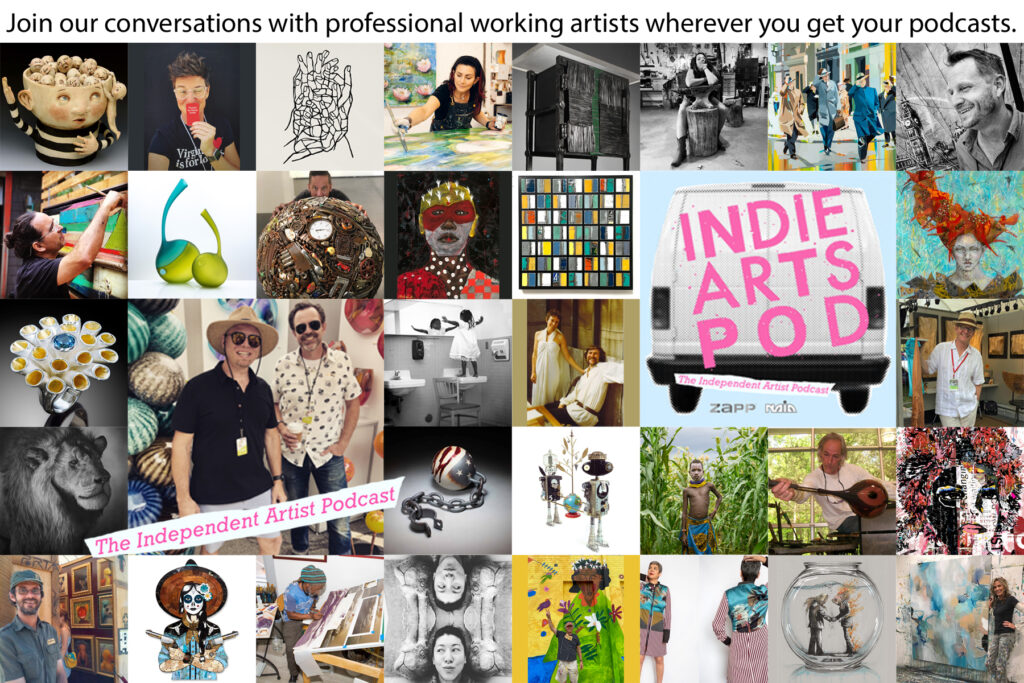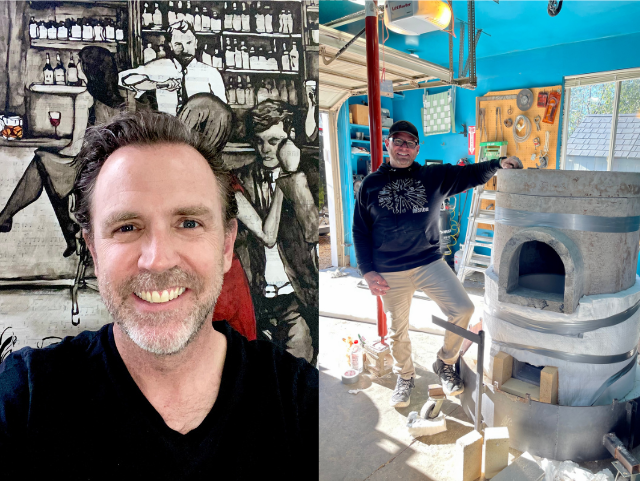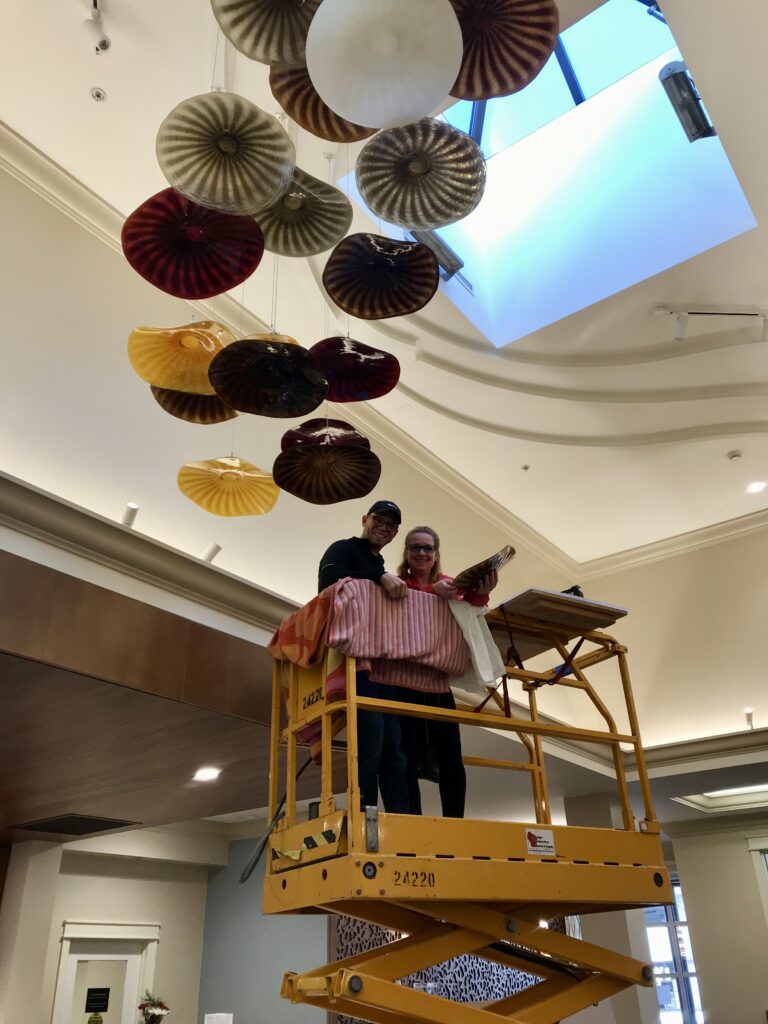
In April 2021, the first episode of the Independent Artist Podcast was released. Since then, co-hosts Douglas Sigwarth and Will Armstrong have interviewed dozens of artists — those who share about their lives traveling and exhibiting at art fairs and festivals — for the podcast. The conversations range in topic, offering a rich tapestry of stories complete with Douglas and Will’s own experiences as roadshow artists. Available on all major podcast streaming services, the Independent Artist Podcast has garnered an engaged following, with thousands of eager listeners tuning in regularly.
ZAPP is proud to sponsor the Independent Artist Podcast alongside the National Association of Independent Artists. In this Q&A, we dive into Douglas and Will’s experiences as podcast hosts and artists and gain unique insights into how the Independent Artist Podcast has become what it is today.
Can you share a brief history of your artistic career for our readers? What inspired you to pursue your respective artistic disciplines?
Will: I was trained as an illustrator, but it turns out I don’t like being lonely or being told what to do. I took my academic training in a fine art direction around 2010 and never looked back. I’d say I was specifically drawn in the direction of this body of work by storytelling and by music.
Douglas: I was drawn to the stage as a young person. I earned my Bachelor of Arts in Theatre with an emphasis on acting. When I met my wife, Renée, in 1993, she had just discovered glassblowing. Her passion toward this medium was extremely attractive and I followed her into the glass studio. Our love for glass and for each other continues to inspire our creative direction.

What motivated you to start the Independent Artist Podcast?
Will: The short answer is Douglas. Douglas did. The long answer is that I had 20 years of radio experience and no current project. I love radio. I love creating something interesting and hopefully entertaining. Douglas can give you the long form.
Douglas: At my first board meeting for The National Association of Independent Artists (NAIA), we discussed the need for community building among art fair artists because we were all stuck at home during the pandemic. I was drawn to the idea of a podcast for artists, and I floated the project to Will, whom I met for the first time at that meeting. I remember how excited we became while we were brainstorming, and the details came together easily. Ultimately, we decided that the podcast should be our personal project where we highlight the stories from the artists we admire rather than a news source for NAIA.
Above-left: Will Armstrong; Above-right: Douglas Sigwarth
What do you consider or go after when selecting guests for your podcast?
Will: Personally, I’m looking to hear from the bright lights, the established leaders and future/up and comers in our field.
Douglas: What he said…plus I focus on stories we haven’t explored with an eye on representation.
Thinking about your podcast interviews or conversations, how do you prepare to engage with guests and ask questions that showcase their unique experiences and insights?
Will: The best way to prepare for an interview or for any form of public speaking is a deep knowledge of the subject or an even bigger curiosity. Douglas and I have different styles of interviewing. I admire his preparedness and thoroughness in thinking through his talks. This lets him roll with things if they go in a different direction than he expects. It always makes for a compelling talk. Personally, I feel like my strengths lie in making it up as I go along. We’ve been talking to some artists together to try and draw out both each other and the different aspects of our guests. Most people, including Douglas, would be horrified to know how little I sit down and actually write out questions. My biggest goal is an honest conversation, so we can all get to know the guest and understand them on a real level better.
Douglas: Before I offer up my suggestions to Will for a guest invitation, I allow those artists into my head for a while. When my curiosity ignites and the questions keep rolling, I feel drawn to seek answers. I am truly inspired by the stories shared from these amazing humans. Before we record, I calm myself so I can become present and open to listen[ing]. My prepared questions go out the window and allow them to naturally come to me in the moment in reaction to where the guest wants to go.

As seasoned festival artists yourselves, could you describe the most memorable moments from your festival experiences? What advice would you give to artists looking to make the most out of festival opportunities and stand out from the crowd?
Will: You only remember the good and the bad, right? I remember water up to my waist at the Boston Mills Flood, pulling my CraftHut canopy off a stop sign 8’ off the street, the 115 degree heat index in Des Moines. I also remember being asked to do posters for a couple of my favorite shows, Fort Worth and Des Moines and later winning awards for them. That was more important to me than awards on the street or even big sales.
Douglas: The connection with our collectors toward our family has been the most meaningful above any career win. For example, there was the time when a collector asked my 8-year-old daughter for her opinion on which piece to buy. Another time, our son was showing his drawings and offering signatures to those strolling by. My advice to stand out is to know who you are as an artist and do that! Nobody else is YOU!
Applying to shows and festivals requires a strategic approach. Could you share some insights into your process of selecting and applying to events that align with your preferences? For example, do you change up what images you use for different events, or showcase new work?
Will: At this point in my career, I know what my favorite shows are, and I know how likely I am to be able to be selected. If it’s an event that’s harder to get into, I’ll back it up with another show, just to make sure I have something. I try to balance my applications with different regions and different time periods throughout the year. You try to put together a season that doesn’t have you zig-zagging across the whole country or running too many shows together in a row.
Douglas: What is it they say about best laid plans? Even the ideal schedule can vary from year to year. It has taken time to learn where our audience is. We pay attention to what works and what doesn’t work, and we evolve. The bottom-line preference for me is if my audience comes to the show. Even if the sales fluctuate, I gauge the types of conversations and the interest. My response to the second part of your question about images is that we typically re-evaluate our lineup yearly and do not sway from it that year. The exception is if the early apps aren’t going our way, we may swap in a substitution. Mostly our lineup remains constant until we get a good read on how it performs.

The podcast likely exposes you to a wide range of artistic perspectives. How has interacting with different artists on your show influenced your own creative process and artistic growth?
Will: I feel like our peers are constantly giving us different pieces of advice that turn a light on inside my big dumb head. We have these A-Ha moments all the time. Also, you have to realize when something just isn’t going to work for your style of art business. I just can’t do everything that some of our brilliant guests suggest. It would make me insane. Maybe we’re all kind of nuts to be doing this. It works somehow, though. Sometimes the pearls our guests drop I will resist completely until months down the line when it finally comes to rest on a project that is going in a different direction. It takes time for these ideas to take hold. I hope that’s true for our guests.
Douglas: I love each personal story. I am deeply inspired by the driving force a lot of us possess. When Lisa Kristine described her work as a calling, I could relate in a way I’d never heard anyone correlate with being an artist. Those types of moments fuel my soul and my creative process.
Finally, what has been the most rewarding aspect of hosting the Independent Artist Podcast? Are there any upcoming projects or episodes that listeners should be excited about?
Will: I really enjoy creating good radio. I’d say that one of the most rewarding and surprising aspects of this project is that I could create it with someone that I didn’t know at all, before it started. Douglas and I are very different. We bring completely different backgrounds, opinions and interests to the show, but always a level of respect for each other’s voice. Douglas doesn’t agree with everything I say and thank god. How boring would that be? If we made boring content, I wouldn’t want to do the show. I enjoy the energy of our conversations together. That is a strength I wouldn’t have expected, but when it works, I think you can really tell.
Douglas: The most rewarding aspect of the podcast for me is when I’m at a show, meeting the listeners who share how meaningful our conversations are to them. It is a relief to know that there are others out there with the same experiences and that we are not alone. Some have mentioned the talks as their therapy. But the most rewarding point for me is that this podcast serves as an entry point for so many independent artists who want to jump into the artist life with a little bit of encouragement and guidance.
Listen to the Independent Artist Podcast here on YouTube, or on your favorite podcast streaming service!
Follow the Independent Artist Podcast to learn when new episodes are available:
Facebook: @IndependentArtistPodcast
Instagram: @IndependentArtistPodcast

